Vishnu
Descends as Rama
Reign
of Terror
In the Krita-yuga, Mandhata
bestowed upon kshatriyas the power to defend law and land.
But as time passed, corruption seeped into
society. Kings and warriors, motivated by desire, not duty, began abusing their
military might to oppress society and plunder its wealth.
Kartaviryarjuna, the king of Haihaiyas,
acquired a thousand arms from Vishnu himself, ostensibly to protect the earth.
But he used them to steal cows.
With that, the age of
perfection came to an end and Treta-yuga, the less-than-ideal second quarter of
the world-cycle, dawned.
Urva's
Wrath
Kartaviryarjuna once raided the
hermitage of the Bhargava brahmanas and stole their cows. Sage Chyavana, leader
of the Bhargayas, tried to make peace but was killed by the Haihaiya king.
Chyavana's son Urva was still
in his mother's womb when he learnt of his father's death. The rage of this
unborn child took the form of a blazing fire that threatened to destroy the
whole world.
Vishnu said to the vengeful
infant, "Do not punish the whole world for the crime of one king."
Hearing Vishnu, Urva flung the flames of his
fury into the sea where it turned into Badavagni, the mare of destruction.
"It will remain under the sea till the end of Kali-yuga when the world
becomes totally corrupt, beyond redemption," said Urva.
Birth
of Bhargava-Rama
Vishnu promised to avenge
Chyavana's death and punish every kshatriya who had strayed from the path of
dharma.
He took birth in the Bhargava
clan as Rama, the youngest son of sage Jamadagni and his wife Renuka.
Though born in a family of priests, Rama had
the disposition of a warrior. He learnt the art of war from Shiva himself and
became an expert in the use of the axe earning the title Parashurama,
Rama-who-wields-the-axe.
Death
of Kartaviryarjuna
Jamadagni was the guardian of
Kamadhenu, the celestial cow which provided enough milk to feed an army a day.
When Kartaviryarjuna learnt about this
miraculous co he came to Jamadagni's hermitage and forcibly dragged Kamadhenu
to his palace.
"If kings of the earth act like thieves,
who will protect weak?" asked Parashurama. Kartaviryarjuna did not reply.
So the lord picked up his axe and hacked the greedy king to death.
Having soiled his hands with
blood, Parashurama went on a pilgrimage to purify himself.
Parashurama's
Vow
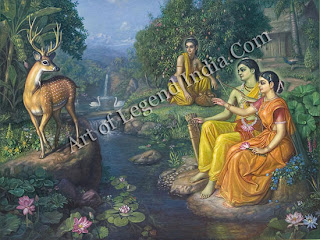 While Parashurama was away,
Kartaviryarjuna's sons decided to avenge their father's death. They raided the
Bhargava hermitage and beheaded jamadagni.
While Parashurama was away,
Kartaviryarjuna's sons decided to avenge their father's death. They raided the
Bhargava hermitage and beheaded jamadagni.
As he watched his mother cry
during his father's cremation, Parashurama took an oath, "Twenty one times
did my mother beat her chest as she mourned for my father; twenty one times
shall I make the kshatriya-women of the world weep for their husbands."
He swore to kill every warrior
and king on the face of the earth who had subverted the law of the land for
personal gain.
Massacre
of Warriors
Parashurama fulfilled his vow
with a ferocity that shocked the world. He slaughtered hundreds and thousands
of kshatriyas, filling ten great lakes with their blood. He became known as the
scourge of the warrior caste.
After the twenty first carnage,
Parashurama became a teacher: he instructed many brahmanas in the art of war to
check the rising domination of the warrior community.
From
Priest to Prince
"It is easy for an
impoverished brahmana like Parashurama to contain his desire for power than it
is for a rich kshatriya," said many a cynic.
To prove them wrong, the lord
descended upon earth as a prince who was willing to sacrifice everything for
the sake of dharma. Rama — noble warrior, just ruler, dutiful son, loving
brother, faithful husband — was the personification of virtue and rectitude, mar
yada purushotta ma, the lord's most august incarnation.
Birth
of Raghava-Rama
Dashratha, king of Ayodhya,
scion of the Raghava dynasty, had three wives but no children. When he
propitiated the gods, they gave him a sacred potion containing the essence of
Vishnu.
After consuming this divine drink, the queens
gave birth to four sons. Rama was the eldest, born to the noble Kaushalya. Next
came Bharata, the son of the beautiful Kaikeyi. The youngest queen Sumitra gave
birth to twins, Lakshmana and Shatrughna.
Rama's
Virtue
Rama radiated a divine aura
from an early age. His noble bearing and caring nature earned him the respect
of young and old alike. Sages and scholars who visited the crt of Dashratha
were touched by his humility, dignity and grace. They spoke highly of this
gentle prince of Ayodhya, of his respect for the laws of the land and his sense
of duty.
Rama was but a boy when he
learnt that the sage Vishvamitra was being tormented by the demons of the
forest. He rushed to the rishi's defence. With his arrows he kept the
trouble-makers at bay while the sage performed his yagna.
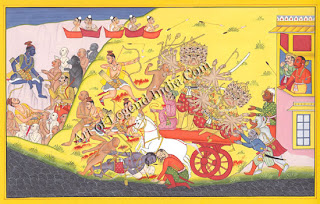 When Rama heard how Ahalya had
been turned to stone for being unfaithful to her husband, he was moved by
compassion to redeem the hapless woman from her miserable fate. Such was the
purity of his being that the touch of his foot washed away Ahalya's sin and
liberated her to rejoin her husband.
When Rama heard how Ahalya had
been turned to stone for being unfaithful to her husband, he was moved by
compassion to redeem the hapless woman from her miserable fate. Such was the
purity of his being that the touch of his foot washed away Ahalya's sin and
liberated her to rejoin her husband.
Sita, the Earth-goddess Rama
broke a mighty bow that could not even be lifted by the gods and won the hand
of Janaka's daughter, Sita, in marnage.
Sita was no ordinary girl. She
was Bhoodevi incarnate. She had emerged from the earth when Janaka, king of Mithila,
was tilling the sacred fields of the earth-goddess with his golden plough.
When Rama married Sita, Vishnu
was reunited with his divine consort Lakshmi on earth.
The
Exile
After Rama's marriage,
Dashratha was so happy that he decided to pass on his crown to his eldest son
and retire into the forest.
But he was stopped by Kaikeyi,
his second queen, who said, "You, once promised me two boons when I saved
your life in a battle. I want them now: I want my son Bharata to be made your
successor and I want Rama to live like a hermit in the forest for fourteen
years."
Rama, on learning this,
discarded his royal robes and left Ayodhya dressed in clothes of bark, without
regret or resentment.
"Let it not be said that a
Raghava king does not keep his word or that a Raghava prince does not obey his
father," he told his people who wept as he departed for the forest.
Bharata
Rejects the Crown
Bharata, the son of Kaikeyi,
refused to rule a kingdom procured through deception.
"I shall rule this land as my brother's
regent until his return," he said placing Rama's sandals on the throne of
Ayodhya.
Bharata, who also contained the
spirit of Vishnu, lived like a hermit, outside the city, refusing to partake of
the luxuries denied to Rama.
While these two brothers
selflessly renounced their claims to the throne of Ayodhya, far away in the
south, a battle raged between two brothers for the throne of Lanka: Ravana,
ten-headed lord of the rakshasas, finally drove his brother Kubera, lord of the
yakshas, out of Lanka and usurped his kingdom and his crown.
Then, mounting Kubera's flying
chariot, the Pushpaka-vimana, Ravana rode across the cosmos indulging in an
orgy of rape and plunder.
A
Life of Misery
Rama meanwhile wandered deep
into the forest, far from Ayodhya, followed by Sita, his dutiful wife.
Lakshmana, his brother, joined them, serving Rama as Ananta-Sesha served Vishnu
in Vaikuntha.
The forest was no sylvan
retreat. Rama, Lakshmana and Sita had to continuously battle the elements,
contending with wild beasts and hostile tribes.
Surpanalcha
Solicits Rama
In the final year of their
exile, while they camped on the banks of the river Godavari, Ravana's sister
Surpanakha cast her lustful eyes on Rama.
Rama turned her away. "I
have a wife already," he said.
"This is the jungle, you
take what you want." So saying Surpanakha attacked Sita intending to kill
her and take her place.
"This is the jungle, you defend what is
yours." So saying Lakshmana raised his sword and cut off Surpanakha's nose
and ears.
Sita's
Abduction
To avenge Surpanakha's
mutilation, Ravana decided to abduct Sita. "With Sita gone, Rama will
forget all about marital fidelity and take you as his wife," he assured
his sister.
While Rama and Lakshmana were
away on a hunt, Ravana approached Sita in the guise of a rishi with a request
for alms.
Sita, too innocent to suspect a sage, welcomed
him in keeping with the sacred laws of hospitality only to be dragged away to
the island-kingdom of Lanka.
Rama's
Fidelity
Separation from Sita broke Rama's
heart.
As he wept, Nature mourned with him: trees
shed leaves, flowers lost their fragrance. The woods, once enlivened by the
presence of Rama and Sita, became a gloomy place.
"Take comfort in our company," said
the birds and beasts of the forests.
"I cannot. None can
replace Sita," said Rama.
Realising he had hurt these
innocent creatures by rejecting their affection, the lord said, "I will
descend upon earth as Krishna who will be playfulness personified, leela
purushottama. Then all of you can be my companions and dance and sing with me
in the meadows of Madhubana."
Rama's
Great Army
The birds and beasts of the
forest promised to help Rama find Sita. Vultures flew high in the sky and
monkeys scoured the earth until they found Rama's beloved on the island of
Lanka locked in Ravana's pleasure-gardens.
The monkeys and bears of the
forest led by the mighty Hanuman and the wise Jambuvan hurled sticks and stones
into the sea to build a bridge to the island of rakshasas. These were kept
afloat by fishes, serpents, seals and other sea-creatures.
Thus did Vishnu rouse the
forces of Nature to rescue his consort.
Ravana
is Defeated
Rama strode across the sea on
the bridge and launched an attack on Lanka with his monkey army.
They stormed the high walls, brought
down the towers and set ablaze the palaces within. The rakshasas with all their
diabolical powers were no match for Rama's army of monkeys who had
righteousness on their side.
Ravana watched in dismay the
defection of his brother Vibhishana, the defeat of his mighty armies, the death
of his brother Kumbhakarna and his son Meghanath at the hands of Rama and
Lakshmana. But he was too proud to release Sita and make peace.
Finally, when all his resources
had been exhausted, he rode into the battlefield himself and confronted Rama.
After a fierce battle, Rama, seated on
Hanuman's shoulder, shot an arrow right through Ravana's heart. As the
rakshasa-king fell, the monkeys and bears who had fought alongside Rama, yelled
out in triumph. Bhoodevi smiled. Her lord had saved her once again.
Sita
is Rejected
Rama did not rejoice. He knew
that the world had lost its innocence. Faith had been replaced by doubt.
When Sita was liberated from
the pleasure-gardens of Lanka, Rama asked her to prove her fidelity. "Show
the world that in body, mind and soul, you have been my faithful wife," he
said.
Sita, surprised by Rama's
order, walked through fire. The flames did not touch her. Agni, the fire-god,
said, "I can burn only impure things. Sita is the earth, Bhoodevi herself,
eternally pure. Nothing can pollute her."
But even Agni's words could not quell the
vulgar suspicions in the hearts of men.
Faithful
Husband
When Rama was crowned king of
Ayodhya, his subjects refused to accept Sita as their queen. "How can she,
who has lived under another man's roof, sit beside our king?" they asked.
Rama, the dutiful king, in
keeping with the wishes of his subjects, abandoned Sita in the forest. But when
they asked him to remarry, he refused, "I exiled the woman you did not
want as a queen. But she still remains my wife. I will remain eternally
faithful to her," he said.
The gods praised Rama. "He is
ekam-patni-vrata, true-to-one-wife," they said.
In the forest, away from the complications of
worldly life, surrounded by gentle birds and beasts in the hermitage of sage
Valmiki, Sita gave birth to Rama's sons: the twins Luva and Kusha.
Rama, meanwhile, performed his
duties as a king with a golden image of Sita by his side. Though he had
sacrificed personal joy, he made sure there was peace and prosperity in the
lives of all his subjects.
Rama's
Royal Horse
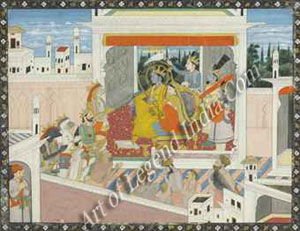 Years after his coronation,
Rama's royal horse was let loose into the forest as part of the ashwamedha
yagna. All the lands it traversed unchallenged came under Rama's suzreignity.
Years after his coronation,
Rama's royal horse was let loose into the forest as part of the ashwamedha
yagna. All the lands it traversed unchallenged came under Rama's suzreignity.
When Rama's horse reached
Sita's abode, it was captured by her twin sons. Luva and Kusha said "We
will not accept the rule of a king who abandons his wife."
A great battle followed. The
armies of Ayodhya tried their best to recover their royal horse but failed.
They were no match for Sita's sons. Even Rama had to accept defeat.
"The power of dharma has enabled the sons
of Sita to defeat the armies of A yodhya," said the gods who advised the
citizens of Ayodhya to accept Sita as their queen.
They agreed on one condition,
"She must prove her purity once again."
Rama
Returns to Vaikuntha
Tired of having her virtue
questioned time and again, Sita said, "If I am pure let me return whence I
came." Instantly the earth opened up and Sita descended into its depths.
The citizens of Ayodhya got
their proof. But Rama lost his wife and with her went his will to stay on
earth.
Rama realised it was time to abandon
Ayodhya and return to Vaikuntha. After appointing his sons as his successors,
he bid farewell to the world of man, walking into the river Sarayu to free
himself from his mortal body.
Mankind mourned Rama's
departure for he was the embodiment of the ideal man; his reign, the Rama-ra
jya, was the most perfect ever.
Writer – Devdutt Pattanaik
 While Parashurama was away,
Kartaviryarjuna's sons decided to avenge their father's death. They raided the
Bhargava hermitage and beheaded jamadagni.
While Parashurama was away,
Kartaviryarjuna's sons decided to avenge their father's death. They raided the
Bhargava hermitage and beheaded jamadagni.  When Rama heard how Ahalya had
been turned to stone for being unfaithful to her husband, he was moved by
compassion to redeem the hapless woman from her miserable fate. Such was the
purity of his being that the touch of his foot washed away Ahalya's sin and
liberated her to rejoin her husband.
When Rama heard how Ahalya had
been turned to stone for being unfaithful to her husband, he was moved by
compassion to redeem the hapless woman from her miserable fate. Such was the
purity of his being that the touch of his foot washed away Ahalya's sin and
liberated her to rejoin her husband.  Years after his coronation,
Rama's royal horse was let loose into the forest as part of the ashwamedha
yagna. All the lands it traversed unchallenged came under Rama's suzreignity.
Years after his coronation,
Rama's royal horse was let loose into the forest as part of the ashwamedha
yagna. All the lands it traversed unchallenged came under Rama's suzreignity.
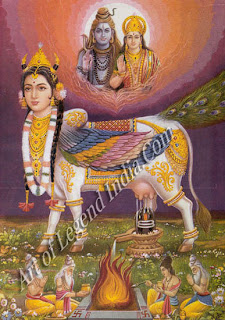
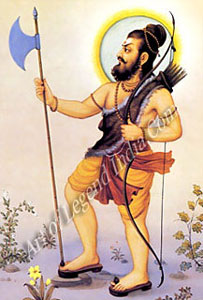
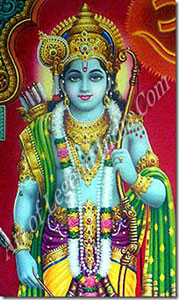
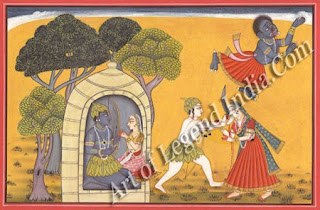


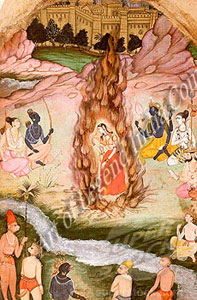



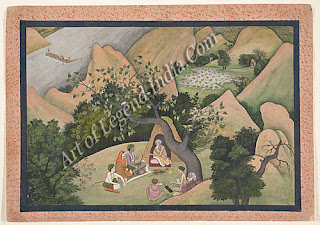










0 Response to "God Vishnu Descends as Rama"
Post a Comment